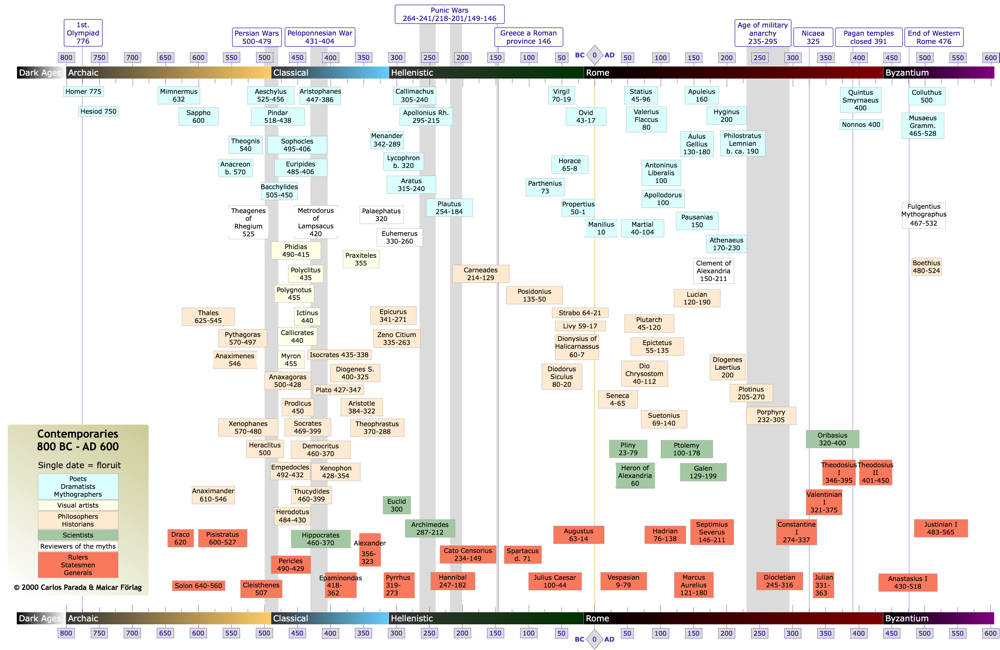| |
Longus (uncertain floruit from 2nd to 6th century AD). Novelist (see also Bibliography).
|
| |
Lucian of Samosata (AD 120-190). Travelling lecturer and writer.
|
| |
Lycophron (born c. 320 BC). Poet and supervisor in the library at Alexandria.
|
| |
Manilius (fl. c. 10 AD). Author of astronomical poem (see also Bibliography).
|
|
|
Marcus Aurelius (AD 121-180). Roman emperor (161-80), follower of Epictetus and author of the Meditations.
|
| |
Martial (AD 40-104). Roman poet and writer of epigrams.
|
|
|
Menander (342-289 BC). A celebrated author of Greek New Comedy ('Dyscolus').
|
| |
Metrodorus of Lampsacus (late 5th century BC). Allegorist, friend of Anaxagoras (to distinguish from his epicurean namesake).
|
| |
Mimnermus (fl. c. 630). Poet. (see also Bibliography).
|
| |
Musaeus Grammaticus (? late 5th c. AD). Poet, author of Hero and Leander.
|
| |
Myron (fl. c. 480-455). Sculptor (the 'Discus-thrower').
|
| |
Nonnus (fl. c. 400 AD ?). Epic poet (see also Bibliography).
|
|
|
Ovid (43 BC-17 AD). Roman poet (see also Bibliography).
|
| |
Oribasius (AD 320-400). Personal physician of Emperor Julian, and compiler of excerpts from earlier medical writers.
|
| |
Palaephatus (late 4th century BC ?). Attempted to rationalize the myths.
|
| |
Parthenius (fl. c. 73 BC). Poet (see also Bibliography).
|
| |
Pausanias (fl. c AD 150). Traveller and writer (see also Bibliography).
|
|
|
Pericles (490-429 BC). Athenian statesman.
|
| |
Phidias (490-415 BC) Athenian sculptor.
|
| |
Philostratus Lemnian (born c. AD 190). Author of 'Eikones', descriptions of paintings at Naples
|
| |
Pindar (519-438 BC). Theban lyric poet (see also Bibliography).
|
| |
Pisistratus (600-527 BC). Athenian statesman.
|
|
|
Plato (427-347 BC). Philosopher, pupil of Socrates and teacher of Aristotle (see also Bibliography).
|
| |
Plautus (254-184 BC). Roman comic dramatist.
|
| |
Pliny the Elder (AD 23-79). Roman encyclopedic writer, author of Natural History.
|
| |
Plotinus (c. AD 205-270). Neoplatonic philosopher.
|
|
|
Plutarch (c. AD 45-120). Essayist and biographer (see also Bibliography).
|
| |
Polyclitus (2nd half of the 5th century BC). Argive sculptor ('Spear bearer').
|
| |
Polygnotus of Thasus (fl. c. 475-47). Wall painter, active in Athens. Not a fragment survives, but his work was described by the traveller Pausanias.
|
| |
Porphyry (c. AD 232-305). Disciple of Plotinus; philosopher and student of religions; author of Life of Pythagoras.
|
|
|
Posidonius (c. 135-50 BC). Historian and philosopher, teacher of Cicero.
|
| |
Propertius (c. 50-1 BC). Roman poet (see also Bibliography).
|
| |
Praxiteles (fl. c. 370-40 BC). Sculptor (Aphrodite of Cnidos, Hermes with infant Dionysus, etc.).
|
| |
Prodicus (contemporary of Socrates). Sophist and author of the myth The Choice of Heracles.
|
| |
Ptolemy (c. 100-178). Astronomer, mathematician and geographer (Claudius Ptolemaeus).
|
|
|
Pyrrhus (319-272 BC). King of Epirus, remembered for his 'pyrrhic victory' against Rome.
|
| |
Pythagoras (c. 570-497 BC). Philosopher and mathematician.
|
| |
Quintus Smyrnaeus (fl. c. 400 BC). Epic poet (see also Bibliography).
|
|
|
Sappho (born c. 612 BC). Lyric poet of Mytilene, Lesbos.
|
|
|
Seneca (c. 4 BC-AD 65). Roman philosopher, writer and advisor to Emperor Nero.
|
|
|
Septimius Severus (AD 146-211). Roman emperor (193-211).
|
|
|
Socrates (469-399 BC). Philosopher.
|
|
|
Solon (640-560 BC). Athenian statesman and legislator.
|
|
|
Sophocles (496-406 BC). Tragic dramatist (see also Bibliography).
|
| |
Spartacus. Gladiator who led a revolt of slaves in 73-71 BC.
|
|
Statius (c. AD 45-96). Roman poet (see also Bibliography).
|
|
Strabo (c. 64 BC-AD 21). Historian and geographer (see also Bibliography).
|
|
Suetonius (c. 69-140). Roman historian and biographer. Author of Lives of the Caesars.
|
|
Thales (c. 625-545 BC). Milesian philosopher asserting that water is the basis of the world.
|
|
Theagenes of Rhegium (fl. c. 525 BC). First scholar to attempt an allegorical interpretation of the myths.
|
|
|
Theodosius I (AD 346-395). Roman emperor (379-95), remembered for having forcibly closed the pagan temples. His contribution is also described thus:
"He stamped out the last vestiges of paganism, put an end to the Arian heresy in the empire, pacified the Goths, left a famous example of penitence for a crime, and reigned as a just and mighty Catholic emperor." (Catholic Encyclopaedia)
|
|
|
Theodosius II (AD 401-450). Roman emperor (402-50).
|
| |
Theognis from Megara (fl. c. 540 BC). Elegiac poet.
|
|
|
Theophrastus (370-288 BC). Philosopher, successor of Aristotle.
|
|
|
Thucydides (c. 460-400 BC). General and historian.
|
| |
Tryphiodorus (3rd, 4th or 5th century AD. Epic poet (see also Bibliography).
|
|
|
Valentinian I (AD 321-375). Roman emperor (364-75).
|
| |
Valerius Flaccus (fl. c. 80 BC; probably dead by 90 BC). Roman poet (see also Bibliography).
|
|
|
Vespasian (AD 9-79). Roman emperor (69-79).
|
|
|
Virgil (70-19 BC). Roman poet (see also Bibliography).
|
| |
Xenophanes (c. 570-480 BC). Philosopher, remembered for his attack against antropomorphism.
|
|
Xenophon (c. 428-354 BC), follower of Socrates, military leader, and historian.
|
|
|
Zeno Citium (335-263 BC). Philosopher, founder of the stoic school.
|

